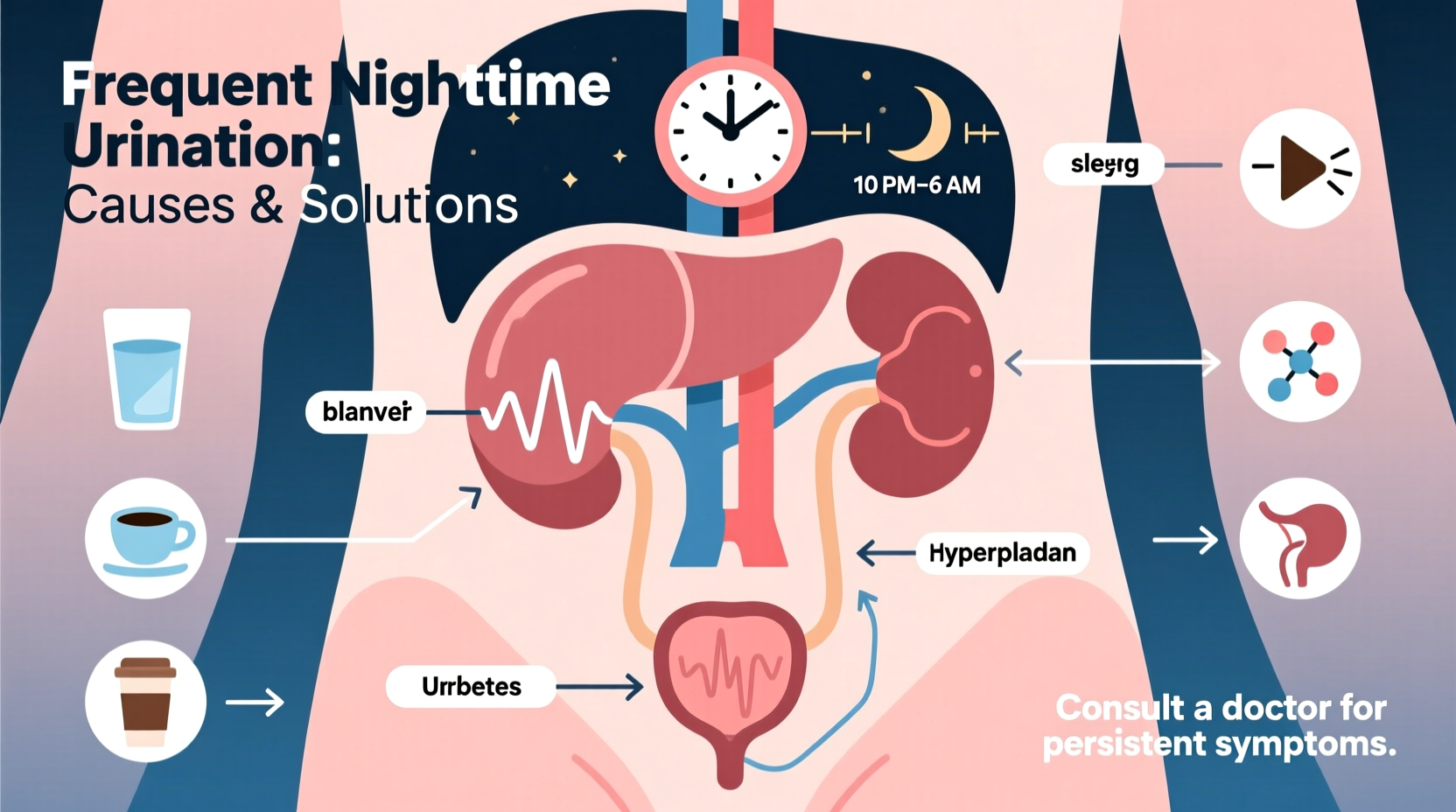Waking up multiple times during the night to use the bathroom is more than just a nuisance—it can disrupt your sleep, affect your energy levels, and diminish overall well-being. Known medically as nocturia, this condition affects millions of adults, especially as they age. While occasional nighttime trips to the restroom are normal, consistently getting up two or more times per night may signal an underlying issue. Understanding the root causes and implementing targeted lifestyle and medical strategies can significantly reduce or even eliminate nocturia.
What Is Nocturia and How Common Is It?

Nocturia is defined as waking up one or more times during the night specifically to urinate. It’s distinct from other forms of urinary frequency because it occurs exclusively during sleep hours. Research shows that prevalence increases with age: about 50% of adults over 50 experience it, and up to 80% of those over 80 report nightly awakenings due to urination.
While often dismissed as a natural part of aging, nocturia is not something you must simply accept. It can be a symptom of treatable conditions ranging from fluid intake habits to chronic diseases like diabetes or heart failure.
Common Causes of Frequent Urination at Night
Nocturia rarely has a single cause. Instead, it typically results from a combination of physiological, behavioral, and medical factors. Below are the most frequent contributors:
- Excessive evening fluid intake: Drinking large amounts of fluids, especially caffeine or alcohol, in the hours before bed increases urine production.
- Bladder storage problems: Conditions like overactive bladder (OAB), prostate enlargement in men, or pelvic floor weakness in women limit how much urine the bladder can hold.
- Nocturnal polyuria: This refers to the body producing too much urine at night. It's responsible for nearly two-thirds of nocturia cases and is often linked to disrupted circadian rhythms in kidney function.
- Sleep disorders: Sleep apnea, in particular, is strongly associated with nocturia. Intermittent low oxygen levels trigger hormonal changes that increase nighttime urine output.
- Medications: Diuretics (\"water pills\") taken in the late afternoon or evening can lead to increased nighttime urination.
- Chronic health conditions: Heart failure, uncontrolled diabetes (both type 1 and 2), and kidney disease alter fluid balance and urine production.
- Pregnancy: In women, pressure from the growing uterus can reduce bladder capacity, leading to frequent nighttime voiding.
“Many patients assume their nighttime urination is inevitable, but in my practice, we find modifiable causes in over 70% of cases.” — Dr. Alan Weiss, Urologist and Sleep Medicine Specialist
How to Stop Frequent Urination at Night: A Step-by-Step Guide
Reducing or eliminating nocturia involves a structured approach combining self-monitoring, behavioral adjustments, and medical evaluation when necessary. Follow these steps to regain uninterrupted sleep:
- Keep a voiding diary for 3–5 days. Record every time you drink fluids and urinate, including volume if possible. Note the time and any symptoms like urgency or discomfort. This helps differentiate between high urine production and low bladder capacity.
- Shift fluid intake earlier in the day. Aim to consume 60–70% of your daily fluids before 6 p.m. Limit beverages after dinner, especially those containing caffeine or alcohol.
- Elevate your legs in the evening. If you have swelling in your legs (edema), lying down with legs raised for 1–2 hours before bed can help reabsorb fluid and reduce nighttime urine formation.
- Review medications with your doctor. If you take diuretics, ask whether taking them earlier in the day could reduce nighttime effects.
- Treat underlying conditions. Get screened for sleep apnea, diabetes, heart disease, or prostate issues. Addressing these often resolves nocturia as a secondary benefit.
- Strengthen pelvic floor muscles. Kegel exercises improve bladder control and increase functional capacity, particularly in women with stress or urge incontinence.
- Consider medication if appropriate. For severe cases, doctors may prescribe desmopressin (a synthetic hormone that reduces urine production) or anticholinergics for overactive bladder.
Do’s and Don’ts: Quick Reference Table
| Do’s | Don’ts |
|---|---|
| Drink most fluids before 6 PM | Consume caffeine or alcohol after 4 PM |
| Use the bathroom right before bed | Hold urine during the day (can weaken bladder) |
| Manage blood pressure and blood sugar | Ignore snoring or daytime fatigue (signs of sleep apnea) |
| Perform daily pelvic floor exercises | Self-diagnose or delay seeing a doctor if symptoms persist |
| Keep a consistent sleep schedule | Take evening diuretics without consulting your doctor |
Real-Life Example: Mark’s Journey to Better Sleep
Mark, a 62-year-old accountant, had been waking up three to four times per night for over a year. He assumed it was just aging until his wife noticed his loud snoring and daytime drowsiness. After a sleep study, he was diagnosed with moderate obstructive sleep apnea. His doctor explained that the repeated drops in oxygen were stimulating atrial natriuretic peptide, a hormone that increases urine production at night.
Within three weeks of using a CPAP machine, Mark reduced his nighttime bathroom trips to zero. “I didn’t realize my snoring was connected to my bladder,” he said. “Now I sleep through the night and feel like I’ve gained back years of energy.”
When to See a Doctor
While lifestyle changes help many people, persistent nocturia warrants medical attention—especially if accompanied by any of the following:
- Pain or burning during urination
- Blood in the urine
- Inability to empty the bladder completely
- Sudden weight loss or excessive thirst
- Swelling in the legs or feet
A urologist or primary care provider may order tests such as a urinalysis, blood glucose check, PSA test (for men), or ultrasound of the bladder. These help rule out infections, diabetes, prostate issues, or kidney dysfunction.
Frequently Asked Questions
Is frequent urination at night a sign of diabetes?
Yes, it can be. High blood sugar levels cause the kidneys to filter excess glucose, which pulls water along with it, increasing urine output. If you’re also experiencing increased thirst, hunger, or unexplained weight loss, get your blood sugar tested promptly.
Can drinking less water help me pee less at night?
Not necessarily. Dehydration can concentrate urine and irritate the bladder, potentially worsening symptoms. The key is timing—stay hydrated during the day and taper off fluids in the evening.
Are there natural remedies for nocturia?
Lifestyle strategies like fluid management, leg elevation, and pelvic floor exercises are effective natural approaches. Some studies suggest herbal supplements like saw palmetto (for men with prostate issues) may help, but always consult your doctor before starting any supplement.
Conclusion: Take Control of Your Nights
Frequent urination at night doesn’t have to be a permanent part of your routine. With careful observation, smart habit changes, and timely medical input, most people can dramatically reduce or eliminate nocturia. Better sleep leads to sharper thinking, improved mood, and greater resilience throughout the day. Start tonight: adjust your fluid schedule, monitor your symptoms, and don’t hesitate to seek professional advice if needed. Your rest—and your health—depends on it.









 浙公网安备
33010002000092号
浙公网安备
33010002000092号 浙B2-20120091-4
浙B2-20120091-4
Comments
No comments yet. Why don't you start the discussion?